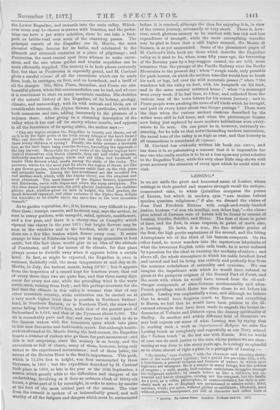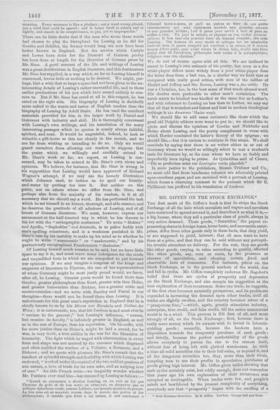LESSIN G.*
Ir we set aside the great and honoured name of Luther, whose writings in their gnarled and massive strength recall the antique, consecrated oaks, to which Quintilian compares the poems of Ennius, but which in modern eyes "non tantam habent speciem quantam religionem ;" if also we discard the claims of Jean Paul Friedrich Richter with rough-and-ready-handed justice, because " si non vie intelligi, non debes legi,"—the cham- pion tetrad of German men of letters will be found to consist of Leasing, Goethe, Schiller, and Heine. The first of these in point of time, and the first, in some respects, in point of merit also is Leasing. He lacks, it is true, the fine artistic genius of the first, the high poetic aspirations of the second, and the biting Aristophanic wit of the third of his famous compeers. On the other hand, lie never wanders into the mysterious labyrinths of what the irreverent English critic calls trash, he is never seduced by a passison for the ideal to overstep the modesty of nature ; and above all, the whole atmosphere in which his noble intellect lived and moved and had its being was entirely and perfectly free from the noisome exhalations of sensuality and cynicism. We can imagine the impatience with which he would have refused to guess at the pompous enigmas of the Second Part of Faust, and the scorn with which he would have turned from the oil-and- vinegar compounds of ultra-German sentimentality and ultra- French persiflage which Heine too often chose to set before his guests. Leasing was emphatically a man, and although we believe that he would have forgiven much to Byron and everything to Burns, we feel that he would have been pitiless to the ill- omened attempts that have been made to engraft the brutal in- decencies of Voltaire and Diderot upon the dreamy spirituality of Shelley. In another and widely different field of literature we may best express our sense of what Leasing was by saying that in reading such a work as Supernatural Religion we miss the Leasing touch as completely and regretfully as our Navy missed the " Nelson touch " in the last war with Russia. But no words of ours can do such justice to the man whose praises we are stain- mering'as was done to him many years ago, in a eulogy so splendid as to claim almost of right a place in a panegyric of Leasing He thinks," says Carlyle:" with the clearness and piercing sharp- ness of the most expert logician ; but a genial fire pervades him, a wit, a heartiness, a general richness and fineness of nature to which most i logicians are strangers. Ho is a sceptic in many things, but the noblest of sceptics ; a mild, manly, half-careless enthusiasm struggles through his indignant unbelief ; he stands before us like a toilworn, but un- wearied and heroic champion, earning not the•conquest, but the battle. As a poet, as a critic, philosopher, or controversialist, his style is pre- cisely such as we of England are accustomed to admire most ; brief, nervous, vivid; yet quiet, without glitter or antithesis ; idiomatic, pure without purism, transparent, yet full of character and reflex hues of * Leasing. By James Stine. London: Trtilmor and Co. 1877.
meaning. Every sentence is like a phalanx ; not a word wrong-placed, nor a word that could be spared ; and it forms itself so calmly and so lightly, and stands in its completeness, so gay, yet so impregnable."
There can be little doubt that if the man who wrote these words had chosen to play the hierophant for Lessing as be did for Goethe and Schiller, the former would long ere now have been better known in England. But the service which Carlyle and Lewes have done for the Dioseuri of German poetry has been done at length for the Hercules of German prose by 1'1r. Siam. A good account of the life and writings of Leasing was a great desideratum in English literature, and this desideratum Mr. Sime has supplied, in a way which, so far as Leasing himself is concerned, leaves little or nothing to be desired. We might, per- haps, hint a wish that so large a space bad not been given to the un- interesting details of Leasing's rather uneventful life, and to those earlier productions of his pen which have ceased entirely to con- cern us. But if Mr. Sime has erred at all in this respect, he has erred on the right side. His biography of Leasing is decidedly more suited to the wants and tastes of English readers than the biography of Leasing by Adolf Stahr. He has used the excellent materials provided for him in the larger work by Danzel and
,Guhrauer with industry and skill. He is thoroughly conversant with Leasing's own writings, and his translation of the many
interesting passages which be quotes is nearly always faithful, spirited, and neat. It would be ungrateful, indeed, to look so valuable a gift-horse as this too closely in the mouth, and we are far from wishing or intending to do so. Only we would guard ourselves from allowing our readers to suppose that the praise which we willingly and cordially extend to Mr. Sime's work so far, wo repeat, as Leasing is con- cerned, may be taken to extend to Mr. Sime's own views and tpinions We believe, for instance, that Mr. Sims is wrong in his supposition that Leasing would have approved of Richard Wagner's attempt, if we may use the homely illustration which Johnson used, to induce us to spoil our brandy- and-water by putting tea into it. But neither on this point, nor on others where we differ from Mr. Sitno, and perhaps also from the majority of his readers, is it at all necessary that we should say a word. He has performed the task which he set himself in an honest, thorough, and able manner, and he deserves the gratitude of all admirers of Leasing, and of all 3overs of German literature. We must, however, express our amusement at the half-hearted way in which he has thrown in his lot with the "orthographic mutineers." To write " Hektor "
cnd Apollo, " Sophoklee " and Aristotle, is to palter feebly with one's spelling conscience, and is a weakness punished in Mr. Sime's case by hie inability to make up his mind as to whether he ought to write " anacreontic " or " anakreontic," and by his portentously cacographical Frankenstein " dia.dochee."
Of Leasing himself much remains to be said, but we have little space to say it in, and must crave some indulgence for the crude and unqualified form in which we are compelled to put forward our opinions. If we may imagine a congress of the kings and
-emperors of literature in Elysium, the one of her representatives IA whom Germany might be most justly proud would, we fancy, after all, be Leasing. Greater poets would be found there than 'Goethe, greater philosophers than Kant, greater wits than Heine, and greater bumourists than Richter, but a greater critic and controversialist—and we write with Bentley and Pascal in our thoughts—there would not be found there than Leasing. It is nnfortunate for this great man's reputation in England that he is chiefly known to us by his Minna von Barnhelnz and .Nathan der Weise ; it is unfortunate, too, that his Laokoon is and must ever be 44 caviare to the general ;" but Leasing's influence, " unseen, but crescive its faculty," is infinitely greater in England, as well as in the rest of Europe, than his reputation. On his coffin, with far more justice than on Heine's, might be laid a sword, for he was, in very truth, a true soldier in the war for the liberation of humanity. The fight which he waged with obscurantism in every form and shape was not marred by the excesses which disgraced -and often nullified the warfare of a Voltaire, a Rousseau, and a Diderot ; and we quote with pleasure Mr. Sime's remark that the intellect of splendid strength and flexibility with which Leasing was
-endowed, " worked under the control of the two noblest passions of our nature, a love of truth for its own sake, and an undying love cf man." An able French critic—we languidly wonder whether Mr. Pattison ever read him—has summed up Leasing as follows :—
" Quand on commence h &tidier Leasing, on no voit en ltd quo Thorame de goat at de bon seas; en avancant, on decouvro qua oe critique dpluchour avait, corn= Leibnle, une grand° manibro de ponser. Le bon sone oat en mauvais ronom dans lo monde dos pobtos at dos Eibilosophes ; it semblo quo livrd h lui mdme, it soit eonclauand h
l'dternol terre-a-torre, et qu'il no puisse so tirer do cos petits raisonnemens qui sent dgalement mortals aux grandee arrours ot aux grandos vdrites ; bref it passe pour servir it tout et pour no suffire h rion. Un jour la nature, so piquant an jou, voulut prouver qu'avoc lo bon sans elle pouvait fuiro un homme complot; ollo erea Leming. Cot homme do sons rassis ot critique flit un admirable dorivain duns lo genre tempera qui cenviout a la raison, et it trouva moyen poet°, sans avoir connu is divine folio, erudit sans faire grand dtat do l'erudition, philosopho sans croire Is Is motaphysique, religieux sans 'aro chrdtien."
We do not of course agree with all this. Wo are inclined to assent to Lessing's own estimate of his poetry, but even as a. fine whist-player differs more widely from a good whist-player than the latter does from a bad one, in a similar way we hold that as
compared with really good critics, with men of the calibre of
Hazlitt and Jeffrey and Ste. Beuve, Leasing was a fine critic. He was a Christian, too, in the best sense of that much-abused word. His doubts were preferable to other men's certainties. The torch which he kindled was kindled at the same fire as Luther's,
and with reference to Leasing no less than to Luther, we may say that all that is soundest and fairest and best in modern theological
writings is am awaitmos 'Ideslov vveOg.
We should like to add some testimonia like those which the
good old Delphic editors were wont to put in ; we should like to quote and discuss the opinions of Goethe and Niehbuhr and Heine about Leasing, and the pretty compliment in verse with which Herder combated the latter's theory of the epigram ; we should like,—but it is useless to continue in this strain. We shall conclude by saying that there is no writer either in or out of Germany whom we would so willingly select to test a student's
taste for literature by, as the man whom we have so feebly and imperfectly been trying to praise. As Quintilian said of Cicero, " Ills se profecisse sciat cui Lessingius valde placebit."
In mere justice to the publishers, Messrs. Triibner and Co., we must add that these handsome volumes are admirably printed upon excellent paper, and are enriched with a portrait of Leasing,
which forms a charming contrast to the portrait which Sir R. Phillimoro has prefixed to his translation of Laokoon.







































 Previous page
Previous page